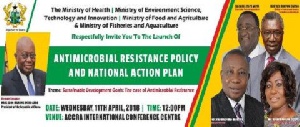Antimicrobial resistance (AMR) is the ability of a microorganism (like bacteria, viruses, and some parasites) to stop an antimicrobial agent (such as antibiotics, antivirals and antimalarials) from working against it.
As a result, standard treatments become ineffective in both humans and animals; infections persist and may spread amongst people and animals. Further implications of AMR are potentially untreatable infections, expensive and more challenging treatment alternatives, excessive burden on social health interventions like health insurance, transfer of resistant bacteria to humans, huge loses in animal production, high cost of controlling infections on farms, to mention a few.
The excessive use of antimicrobial agents in food animals as well as traces of antimicrobial agents in waste material from various sources such as hospitals, farms and industry (which end up in the food chain) promotes AMR. AMR affects every country including Ghana and every person who would require treatment for infections. This makes the management of AMR a serious issue for all.
Research has revealed that the misuse of antimicrobial agents is a major contributor to AMR. The range of diseases common to persons in Ghana includes infectious diseases, which would be treated with one antimicrobial agent or the other.
This implies that every person has a role to play in the fight against AMR. Such practices as sharing your prescribed antibiotics with other people, self-medication with antibiotics, stopping treatment with antibiotics midway when you feel better, not storing antibiotics properly, or using it in animals and poultry without expert advise must be frowned upon and stopped.
It is also known that not many new antibiotics are being developed; and sometimes after huge investments to develop a new antibiotic, microorganisms get resistant in a very short time. This implies that society must be a good steward of the existing antimicrobials for current and future generations.
The government, through the Ministries responsible for health, agriculture, fisheries and environment, has made efforts to mitigate the impact of AMR on all persons living in Ghana. The MOH embraced the ReAct (Action against antibiotic resistance) project to support national efforts at combating AMR.
Sustained commitment from several stakeholders in all affected sectors such as health, agriculture, fisheries, and environment, has led to the development of a multi-sectoral AMR policy for Ghana, with a 5-year National Action Plan, which seeks to bring together all stakeholders to work towards health security, food safety and environmental safety.
It is important that all persons support the efforts of government, to ensure that the intensions expressed in this policy are achieved.
Simple practices such as completing the entire course of antimicrobial treatment in both humans and animals, taking antimicrobial agents as prescribed by your health professional or veterinarian; stringent regulation of medicines including antimicrobial agents, of should be encouraged.
These would go a long way to preserve this very important group of medications current and future generations.
Launch of the Policy and National Action Plan on Antimicrobial Use and Resistance for Ghana
Antimicrobial resistance (AMR) is the ability of a microorganism (like bacteria, viruses, and some parasites) to stop an antimicrobial agent (such as antibiotics, antivirals and antimalarials) from working against it.
As a result, standard treatments become ineffective in both humans and animals; infections persist and may spread amongst people and animals. Further implications of AMR are potentially untreatable infections, expensive and more challenging treatment alternatives, excessive burden on social health interventions like health insurance, transfer of resistant bacteria to humans, huge loses in animal production, high cost of controlling infections on farms, to mention a few.
The excessive use of antimicrobial agents in food animals as well as traces of antimicrobial agents in waste material from various sources such as hospitals, farms and industry (which end up in the food chain) promotes AMR. AMR affects every country including Ghana and every person who would require treatment for infections. This makes the management of AMR a serious issue for all.
Research has revealed that the misuse of antimicrobial agents is a major contributor to AMR. The range of diseases common to persons in Ghana includes infectious diseases, which would be treated with one antimicrobial agent or the other. This implies that every person has a role to play in the fight against AMR. Such practices as sharing your prescribed antibiotics with other people, self-medication with antibiotics, stopping treatment with antibiotics midway when you feel better, not storing antibiotics properly, or using it in animals and poultry without expert advise must be frowned upon and stopped.
It is also known that not many new antibiotics are being developed; and sometimes after huge investments to develop a new antibiotic, microorganisms get resistant in a very short time. This implies that society must be a good steward of the existing antimicrobials for current and future generations.
Government, through the Ministries responsible for health, agriculture, fisheries and environment, has made efforts to mitigate the impact of AMR on all persons living in Ghana. The MOH embraced the ReAct (Action against antibiotic resistance) project to support national efforts at combating AMR. Sustained commitment from several stakeholders in all affected sectors such as health, agriculture, fisheries, and environment, has led to the development of a multi-sectoral AMR policy for Ghana, with a 5-year National Action Plan, which seeks to bring together all stakeholders to work towards health security, food safety and environmental safety.
It is important that all persons support the efforts of government, to ensure that the intensions expressed in this policy are achieved.
Simple practices such as completing the entire course of antimicrobial treatment in both humans and animals, taking antimicrobial agents as prescribed by your health professional or veterinarian; stringent regulation of medicines including antimicrobial agents, of should be encouraged.
These would go a long way to preserve this very important group of medications current and future generations.
General News of Wednesday, 11 April 2018
Source: peacefmonline.com

















